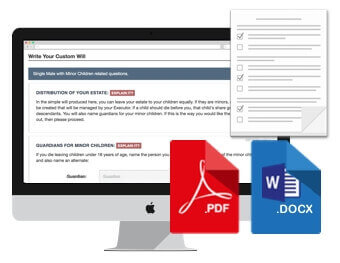Will Requirements
The questionnaire on this site will walk you through the process of filling out your Will and produce a valid, state-specific document. Although you don’t necessarily need to remember all the requirements discussed below, it may be helpful to become familiar with the components of a Will. Generally, a Will includes the following information:
- Your name and place of residence
- A description of your assets
- Names of spouse, children and other beneficiaries
- Alternate beneficiaries, in the event a beneficiary dies before you do
- Specific gifts
- Name of an executor
- Name of a guardian for minor children
- Name of an alternative guardian, in the event your first choice is unable or unwilling to act
- Your signature
- Witnesses' signatures
In order to ensure that the Will accurately states your wishes (and that you are the one who actually created the document), there are several added technical requirements:
- The Will must be typewritten or computer-generated (unless formal requirements are followed for a handwritten (or holographic) Will.
- The document must expressly state that it is your Will.
- You must date and sign the Will.
- The Will must be signed by at least two, or in some states, three, witnesses. They must watch you sign the will, though they don't need to read it. Your witnesses must be people who will not inherit anything under the will.
The will does not have to be notarized in order to be valid. However, if you and your witnesses sign an affidavit (sworn statement) before a notary public, you can help simplify the court procedures required to prove the validity of the Will after you die. This procedure makes the will “self-proving.”
Protect yourself and your family with a legally binding Will.
Protect yourself and your family with a legally binding Will.
100% FREE of charge with instant .docx and .pdf download.

